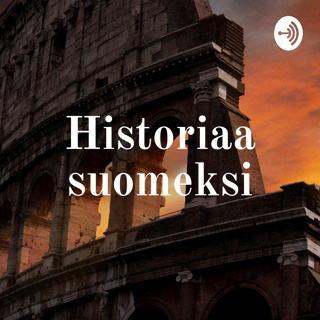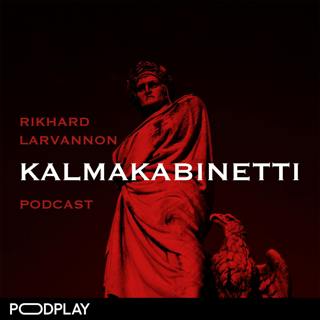
The Late Devonian Extinction
Melvyn Bragg and guests discuss the devastating mass extinctions of the Late Devonian Period, roughly 370 million years ago, when around 70 percent of species disappeared. Scientists are still trying to establish exactly what happened, when and why, but this was not as sudden as when an asteroid hits Earth. The Devonian Period had seen the first trees and soils and it had such a diversity of sea life that it’s known as the Age of Fishes, some of them massive and armoured, and, in one of the iconic stages in evolution, some of them moving onto land for the first time. One of the most important theories for the first stage of this extinction is that the new soils washed into oceans, leading to algal blooms that left the waters without oxygen and suffocated the marine life. The image above is an abstract group of the huge, armoured Dunkleosteus fish, lost in the Late Devonian ExtinctionWith Jessica Whiteside Associate Professor of Geochemistry in the Department of Ocean and Earth Science at the University of SouthamptonDavid Bond Professor of Geology at the University of HullAndMike Benton Professor of Vertebrate Paleontology at the School of Life Sciences, University of Bristol.
11 Maalis 202149min

The Rime of the Ancient Mariner
In this 900th edition of the programme, Melvyn Bragg and guests discuss one of the best known and most influential of the poems of the Romantic movement. Samuel Taylor Coleridge (1772-1834) wrote The Rime of the Ancient Mariner in 1798 after discussions with his friend Wordsworth. He refined it for the rest of his life, and it came to define him, a foreshadowing of his opium-addicted, lonely wandering and deepening sense of guilt. The poem tells of a sailor compelled to tell and retell the story of a terrible voyage in his youth, this time as guests are heading to a wedding party, where he stoppeth one of three.The image above is from Gustave Doré's illustration of the mariner's shooting of the albatross, for an 1877 German language edition of the poemWithSir Jonathan Bate Professor of Environmental Humanities at Arizona State UniversityTom Mole Professor of English Literature and Book History at the University of EdinburghAnd Rosemary Ashton Emeritus Quain Professor of English Language and Literature at University College LondonProducer: Simon Tillotson
4 Maalis 202153min

Marcus Aurelius
Melvyn Bragg and guests discuss the man who, according to Machiavelli, was the last of the Five Good Emperors. Marcus Aurelius, 121 to 180 AD, has long been known as a model of the philosopher king, a Stoic who, while on military campaigns, compiled ideas on how best to live his life, and how best to rule. These ideas became known as his Meditations, and they have been treasured by many as an insight into the mind of a Roman emperor, and an example of how to avoid the corruption of power in turbulent times.The image above shows part of a bronze equestrian statue of Marcus Aurelius.With Simon Goldhill Professor of Greek Literature and Culture and Fellow of King’s College, CambridgeAngie Hobbs Professor of the Public Understanding of Philosophy at the University of SheffieldAndCatharine Edwards Professor of Classics and Ancient History at Birkbeck, University of LondonProducer: Simon Tillotson
25 Helmi 202152min

Medieval Pilgrimage
Melvyn Bragg and guests discuss the idea and experience of Christian pilgrimage in Europe from the 12th to the 15th centuries, which figured so strongly in the imagination of the age. For those able and willing to travel, there were countless destinations from Jerusalem, Rome and Santiago de Compostela to the smaller local shrines associated with miracles and relics of the saints. Meanwhile, for those unable or not allowed to travel there were journeys of the mind, inspired by guidebooks that would tell the faithful how many steps they could take around their homes to replicate the walk to the main destinations in Rome and the Holy Land, passing paintings of the places on their route. The image above is of a badge of St Thomas of Canterbury, worn by pilgrims who had journeyed to his shrine.WithMiri Rubin Professor of Medieval and Early Modern History at Queen Mary, University of LondonKathryn Rudy Professor of Art History at the University of St AndrewsAndAnthony Bale Professor of Medieval Studies and Dean of the School of Arts at Birkbeck, University of LondonProducer: Simon Tillotson
18 Helmi 202150min

The Rosetta Stone
Melvyn Bragg and guests discuss one of the most famous museum objects in the world, shown in the image above in replica, and dating from around 196 BC. It is a damaged, dark granite block on which you can faintly see three scripts engraved: Greek at the bottom, Demotic in the middle and Hieroglyphs at the top. Napoleon’s soldiers found it in a Mamluk fort at Rosetta on the Egyptian coast, and soon realised the Greek words could be used to unlock the hieroglyphs. It was another 20 years before Champollion deciphered them, becoming the first to understand the hieroglyphs since they fell out of use 1500 years before and so opening up the written culture of ancient Egypt to the modern age.With Penelope Wilson Associate Professor of Egyptian Archaeology at Durham UniversityCampbell Price Curator of Egypt and Sudan at the Manchester MuseumAndRichard Bruce Parkinson Professor of Egyptology and Fellow of The Queen’s College, University of OxfordProducer: Simon Tillotson
11 Helmi 202147min

Emilie du Châtelet
Melvyn Bragg and guests discuss one of the outstanding French mathematicians and natural philosophers of the 18th Century, celebrated across Europe. Emilie du Châtelet, 1706-49, created a translation of Newton’s Principia from Latin into French that helped spread the light of mathematics on the emerging science, and her own book Institutions de Physique, with its lessons on physics, was welcomed as profound. She had the privileges of wealth and aristocracy, yet had to fight to be taken seriously as an intellectual in a world of ideas that was almost exclusively male. WithPatricia Fara Emeritus Fellow of Clare College, CambridgeDavid Wootton Anniversary Professor of History at the University of YorkAndJudith Zinsser Professor Emerita of History at Miami University of Ohio and biographer of Emilie du Châtelet.Producer: Simon Tillotson
4 Helmi 202149min

Saint Cuthbert
Melvyn Bragg and guests discuss the Northumbrian man who, for 500 years, was the pre-eminent English saint, to be matched only by Thomas Becket after his martyrdom in 1170. Now at Durham, Cuthbert was buried first on Lindisfarne in 687AD, where monks shared vivid stories of his sanctifying miracles, his healing, and his power over nature, and his final tomb became a major site of pilgrimage. In his lifetime he was both hermit and kingmaker, bishop and travelling priest, and the many accounts we have of him, including two by Bede, tell us much of the values of those who venerated him so soon after his death.The image above is from a stained glass window in the south aisle of the nave in Durham Cathedral: 'St Cuthbert praying before his cell in the Farne Island'With Jane Hawkes Professor of Medieval Art History at the University of YorkSarah Foot The Regius Professor of Ecclesiastical History at the University of Oxford and Canon of Christ Church CathedralAnd John Hines Professor of Archaeology at Cardiff UniversityProducer: Simon Tillotson
28 Tammi 202156min

The Plague of Justinian
Melvyn Bragg and guests discuss the plague that broke out in Constantinople 541AD, in the reign of Emperor Justinian. According to the historian Procopius, writing in Byzantium at the time, this was a plague by which the whole human race came near to being destroyed, embracing the whole world, and blighting the lives of all mankind. The bacterium behind the Black Death has since been found on human remains from that time, and the symptoms described were the same, and evidence of this plague has since been traced around the Mediterranean and from Syria to Britain and Ireland. The question of how devastating it truly was, though, is yet to be resolved.With John Haldon Professor of Byzantine History and Hellenic Studies Emeritus at Princeton UniversityRebecca Flemming Senior Lecturer in Classics at the University of CambridgeAndGreg Woolf Director of the Institute of Classical Studies, University of LondonProducer: Simon Tillotson
21 Tammi 202148min






















